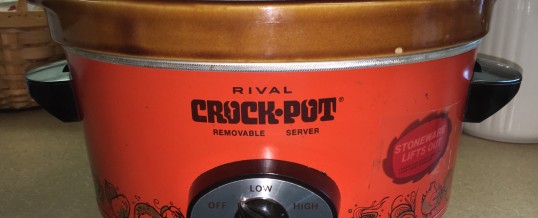
During a recent discussion with coworkers, someone asked me what was typically served every Sunday after church when I was a kid.
Of course, I said pot roast.
Pot roasts migrated from the oven to the Crock-Pot during my childhood. The Crock-Pot was and still is the perfect cooking appliance for a pot roast. It was also the original set-it-and-forget-it appliance.
Moms would get up in the morning and sear the roast in a cast iron skillet, then toss it and an accompaniment of potatoes, carrots and onions in the Crock-Pot, turn it on low, and the family would then head off to church. Returning to a house filled with the aroma of fresh roast beef was an amazing thing.
Today, we have grown accustomed to instant everything. But the Crock-Pot, a copyrighted name owned by a company called Rival that has now become a generic term like Kleenex and Coke, truly was a game changer.
That is, until the government got involved. Yes, you read that correctly. The government got involved in Crock-Pots and all other slow cookers.
And you know what happens when the government gets involved in something. It gets worse. And that’s what has happened with Crock-Pots.
How I discovered this little tidbit of technological trivia all started with a Christmas gift a few years ago. We received a brand new Crock-Pot from a friend. Happy to receive the new slow cooker, we gave away our 1970s Rival model.
We should never have done that.
The first time we tried to use our new Crock-Pot, we noticed that it was boiling, even when it was set on low. Now, I’m by no means a scientist, but I’m pretty sure that boiling and slow cooker shouldn’t be used in the same sentence.
Thinking that our new Crock-Pot was defective, I went online to see if there had been a recall on that make and model. Instead, I found online forums full of angry women and men who had done the same thing we had. They got rid of their old cooker and got a new one.
From what I’ve been able to ascertain, at some point in the not-so-distant past, the government mandated that slow cookers had to boil food on the low setting. You can imagine what kind of pot roast that produces. Somehow, even though humans have survived for thousands of years by preparing our own food, the government felt it necessary to intervene.
My next stop online was eBay. I wanted to find the same model of Crock-Pot we had given away and buy it. What I found was that those who possessed the old Crock-Pots knew what they had, and they knew that they could charge accordingly. The one we wanted to get back was going for $79, plus shipping.
I closed my Internet browser and started scouring garage sales, estate sales, and junk shops for old Crock-Pots. I found several. I began picking them up for $5 or $10 each. Some were in fair shape, others were in great shape, but most just needed a good cleaning. I took my Crock-Pot search seriously because I wanted to make sure that as many of my family members who wanted one of the original good ones, got one.
Over the course of a couple of years, I acquired several vintage models. However, I never found the exact one we wanted, so to get the orange metal model, which has a removable pot and cheesy 1970s graphics, I wound up back on eBay and paid the premium price.
But, it was completely worth it. Now, we can get up in the morning and sear the roast in a cast iron skillet, then toss it and an accompaniment of potatoes, carrots and onions in the Crock-Pot, turn it on low, and return to a house filled with the aroma of fresh roast beef.
If I ever have the opportunity to cook for the government Crock-Pot crackpots who got involved in the slow cooker business, I’ll be sure to dig out the new one we got as a gift, and fix them plenty of overcooked pork.
©2016 John Moore
To read additional blogs, visit johnmoore.net/blog
JUL
2016
